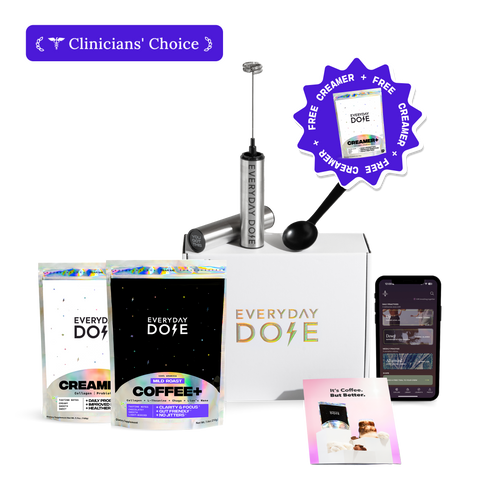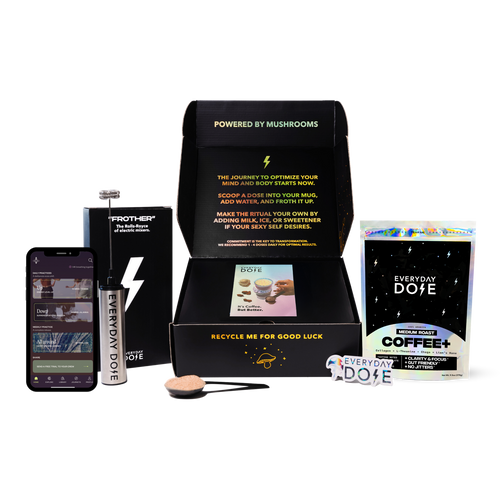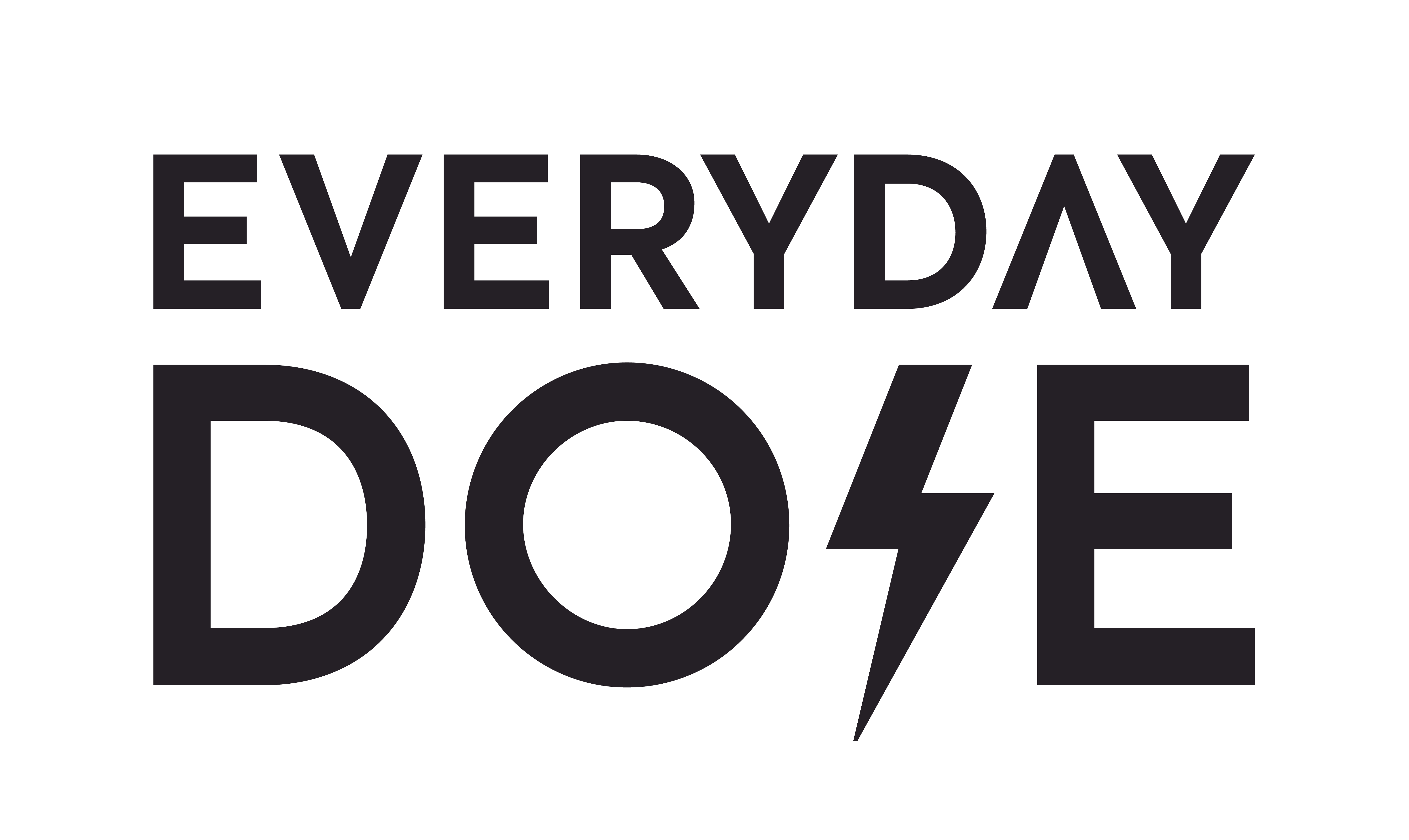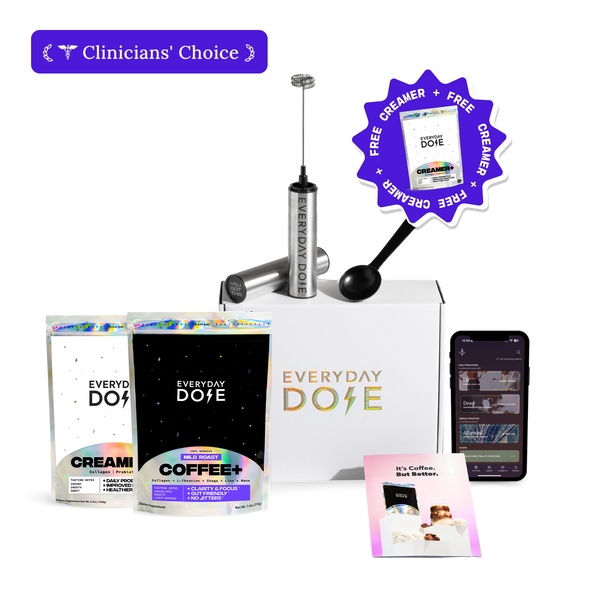How Does Caffeine Work?

Have you ever learned something new about your best friend? You know, the one you know like the back of your hand? That’s kind of how we felt when we first did the research on how caffeine truly works in the body.
Knowing how caffeine works can help you better understand its side effects and, most importantly, how to avoid them. After all, no one likes to feel stressed and sweaty when they’re starting their day. Read on to learn more about caffeine and how you can set yourself up for success with your morning cuppa.
What Is Caffeine?
We’ve all heard of caffeine. Most of us take advantage of it on a daily basis, whether we knock back a cup of coffee every morning or partake in an after-lunch energy drink. But what is it, really?
Caffeine is a naturally occurring stimulant found in over 60 plant species, including coffee beans, tea leaves, cacao pods, and yerba mate. Chemically, it’s classified as a methylxanthine, which sounds like something out of a Marvel villain lineup but is actually what gives caffeine its energy-supporting abilities.
Most people take caffeine to energize the central nervous system and gently slap their brain into wakefulness. It’s the most widely consumed psychoactive substance on Earth, and — good news — it’s legal and socially encouraged. But before we talk about what it does, let’s talk about how it works.
How Does Caffeine Work in the Body?
Caffeine doesn’t give you energy per se. Instead, it blocks the chemical in your brain that tells you you’re tired. That chemical is adenosine, a neurotransmitter that normally builds up in your brain throughout the day and makes you feel sleepy. Caffeine sneaks in and hogs all the adenosine receptors, preventing adenosine from doing its job.
But caffeine isn’t just an adenosine blocker. It’s also a mood booster. By preventing adenosine from doing its job, caffeine indirectly encourages the activity of dopamine and norepinephrine, two neurotransmitters that help you feel sharper and more focused.
In higher doses, caffeine can even inhibit something called phosphodiesterase. This leads to increased levels of cyclic AMP (cAMP), a molecule that supports fat burning and athletic performance.
What Are the Effects of Caffeine?
So, we know what caffeine does — but what does that mean for you? Let’s learn about how these changes can affect the way you go about your day.
Central Nervous System
Blocking adenosine not only keeps you awake but also enhances your reaction time, mood, and mental performance. That’s why your morning cup makes you feel more alive, energetic, and ready to tackle just about anything. Caffeine also increases dopamine signaling, which is why you may feel happier and more motivated after a good brew.
However, there’s a fine line between “alert” and “anxious,” and overdoing it can lead to jitters, restlessness, or even temporary insomnia. Everyone’s tolerance is different, and if you’ve ever felt wired after a single cup while your coworker calmly downs five shots of espresso, you can blame genetics.
Cardiovascular System
When you consume caffeine, it can cause a short-term increase in heart rate and blood pressure. For most healthy adults, this effect is minor and temporary. But if you already have high blood pressure or heart sensitivity, it’s worth talking with a doctor before mainlining cold brew.
Interestingly, caffeine also constricts blood vessels, which is why it’s sometimes used in headache medications. By tightening things up, it helps relieve that pounding feeling in your skull.
Respiratory System
As a bronchodilator, caffeine relaxes the smooth muscles in your airways, making it easier to breathe. This effect is mild but measurable, which is why it’s being researched for its ability to help with asthma symptoms (though never a replacement for an inhaler).
The magic here happens because caffeine increases cAMP levels, which can help dilate the bronchial passages. If you’ve ever felt like you could finally catch a breath after taking a sip of your morning cuppa, now you know why!
Gastrointestinal System
If your morning brew sends you straight to the bathroom, you’re not imagining things. Caffeine stimulates the gastrocolic reflex, signaling your colon to get moving. It also increases gastric acid secretion, which can help with digestion, but might also aggravate acid reflux or ulcers if you’re prone to those.
Essentially, caffeine gives your GI system a gentle nudge in the right direction (or a firm shove, depending on your sensitivity). That said, if you have gastrointestinal issues, it might be worth switching to low-acid coffee or cutting back on caffeine to see how your gut responds.
Is Caffeine Addictive?
We know this is a hard truth to hear, but caffeine is habit-forming. While it's not technically addictive in the way nicotine or opioids are, caffeine dependence is a thing. Your brain, clever as it is, responds to constant caffeine by growing more adenosine receptors. That way, there are more receptors for adenosine to land on — even when caffeine takes up a ton of them.
However, this means you’ll need more caffeine to feel the same effects, and if you suddenly quit, you might experience withdrawal symptoms like headaches, fatigue, irritability, and mood dips until your brain goes back to normal. The good news is that you’re not doomed to a never-ending caffeine spiral.
How To Avoid Caffeine Dependence
To avoid dependence, cycle your caffeine intake. Try going caffeine-free one or two days a week or switching to lower-caffeine options like our Mushroom Coffee+ for your daily brew. Our mushroom coffee is a serious game-changer when it comes to breaking those caffeine habits.
First of all, each Dose only contains 45 mg of caffeine, which we’ve found to be a good sweet spot for experiencing the benefits of caffeine without overloading your system. Each serving also contains a nootropic blend designed to clear up your mind, strengthen your motivation, and sharpen your focus.
This blend features L-theanine, lion’s mane mushroom, chaga mushroom, and coffee extract. Together, these ingredients can also support gut health, encourage a good night’s sleep, reinforce your immune system, and of course, bring the robust, earthy coffee flavor we all love.
Be mindful of hidden caffeine sources, too. Energy drinks, chocolate, pre-workout powders, and even certain pain relievers can secretly add to your daily intake.
And remember, moderation is key. The FDA suggests up to 400 mg/day for healthy adults, which is about three to four cups of coffee (not triple-shot lattes with syrup and whipped cream).
That being said, everyone’s caffeine metabolism is different, and it’s generally best to just go by how you feel. And, if you feel like your caffeine tolerance is way too high, you can always reset it by being mindful of how much you’re taking and preparing for a few days of headaches.
The Bottom Line
Caffeine might be your morning crutch, but it’s also a fascinating, brain-supporting stimulant with real science behind it. From blocking adenosine to influencing your heart rate, lungs, and gut, caffeine touches nearly every part of your body.
When used wisely (and sparingly), it can sharpen your focus and elevate your mood without dragging you into dependency. That’s why, unlike other brands of mushroom coffee, we’ve decided to keep the caffeine, just with some boundaries in place. Try some of our mushroom drinks today to see what we’re talking about!
Sources:
Caffeine and Substance Use Disorders | PMC
Open for Discussion: Caffeine | American Chemical Society
Caffeine Induces Dopamine and Glutamate Release in the Shell of the Nucleus Accumbens | PMC
Caffeine: How does it affect blood pressure? | Mayo Clinic
Energy Drinks, Caffeine and Your Digestion | Michigan Medicine
Start your day
The Right Way









